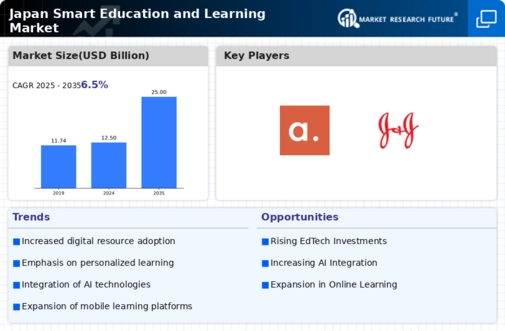Emphasis on STEM Education
The Japan smart education learning market is increasingly focusing on STEM (Science, Technology, Engineering, and Mathematics) education as a response to the growing demand for skilled professionals in these fields. The Japanese government has recognized the importance of fostering a strong STEM workforce to maintain its competitive edge in the global economy. As a result, educational institutions are incorporating advanced technologies and curricula that emphasize STEM learning. Reports indicate that investments in STEM education have surged, with a projected increase of 15% in funding for related programs by 2026. This emphasis on STEM not only prepares students for future careers but also stimulates the growth of the smart education learning market by driving the development of specialized educational resources.
Government Initiatives and Funding
The Japan smart education learning market is significantly influenced by government initiatives aimed at enhancing educational technology. The Ministry of Education, Culture, Sports, Science and Technology (MEXT) has implemented various policies to promote digital learning environments in schools. For instance, the 'GIGA School Program' aims to provide every student with a personal device and high-speed internet access. This initiative is expected to increase the adoption of smart education tools, thereby driving market growth. In 2025, the government allocated approximately 100 billion yen to support educational technology, indicating a strong commitment to advancing the smart education learning market. Such funding not only facilitates the procurement of digital resources but also encourages the development of innovative educational solutions tailored to the needs of Japanese students.
Increased Focus on Student-Centric Learning
The Japan smart education learning market is experiencing a paradigm shift towards student-centric learning approaches. Educational institutions are increasingly recognizing the importance of tailoring learning experiences to meet individual student needs. This shift is supported by the adoption of adaptive learning technologies that analyze student performance and provide personalized feedback. Recent studies indicate that schools implementing student-centric methodologies have reported improved academic outcomes and higher student engagement levels. As a result, the demand for adaptive learning platforms is on the rise, with projections suggesting a market growth of 20% annually. This focus on personalized education not only enhances the learning experience but also drives innovation within the smart education learning market.
Rising Demand for Remote Learning Solutions
The Japan smart education learning market is witnessing a rising demand for remote learning solutions, particularly in urban areas where educational institutions are increasingly adopting hybrid learning models. According to recent surveys, approximately 70% of educators in Japan have reported a preference for integrating online learning platforms into their curricula. This trend is driven by the need for flexible learning options that cater to diverse student needs. As a result, companies specializing in e-learning technologies are experiencing substantial growth, with the market projected to reach 1 trillion yen by 2026. This shift towards remote learning not only enhances accessibility but also fosters a more personalized educational experience, thereby propelling the smart education learning market forward.
Technological Advancements in Educational Tools
Technological advancements play a pivotal role in shaping the Japan smart education learning market. The integration of cutting-edge technologies such as augmented reality (AR) and virtual reality (VR) into educational tools is transforming traditional learning methodologies. For instance, several Japanese companies are developing AR applications that allow students to engage with complex subjects in an interactive manner. The market for AR and VR in education is expected to grow significantly, with estimates suggesting a compound annual growth rate of over 30% in the coming years. This technological evolution not only enhances student engagement but also equips educators with innovative tools to facilitate effective learning, thereby driving the smart education learning market.












